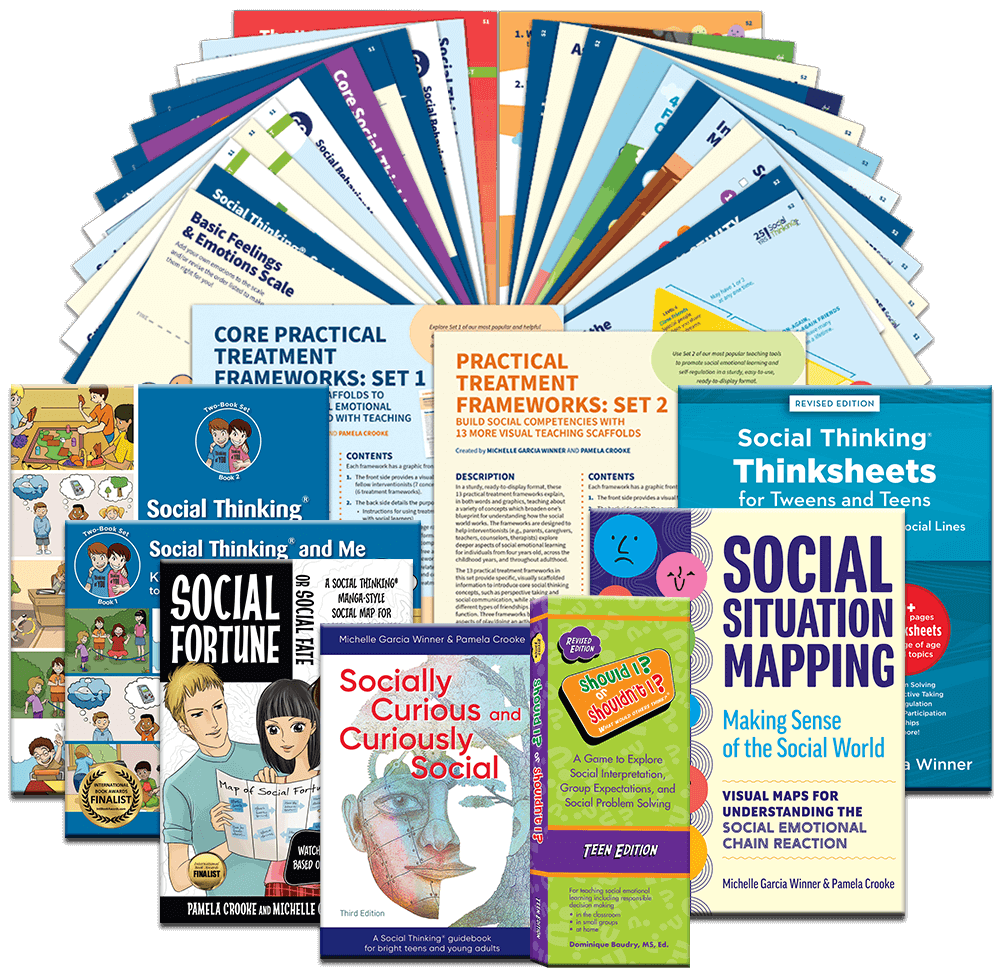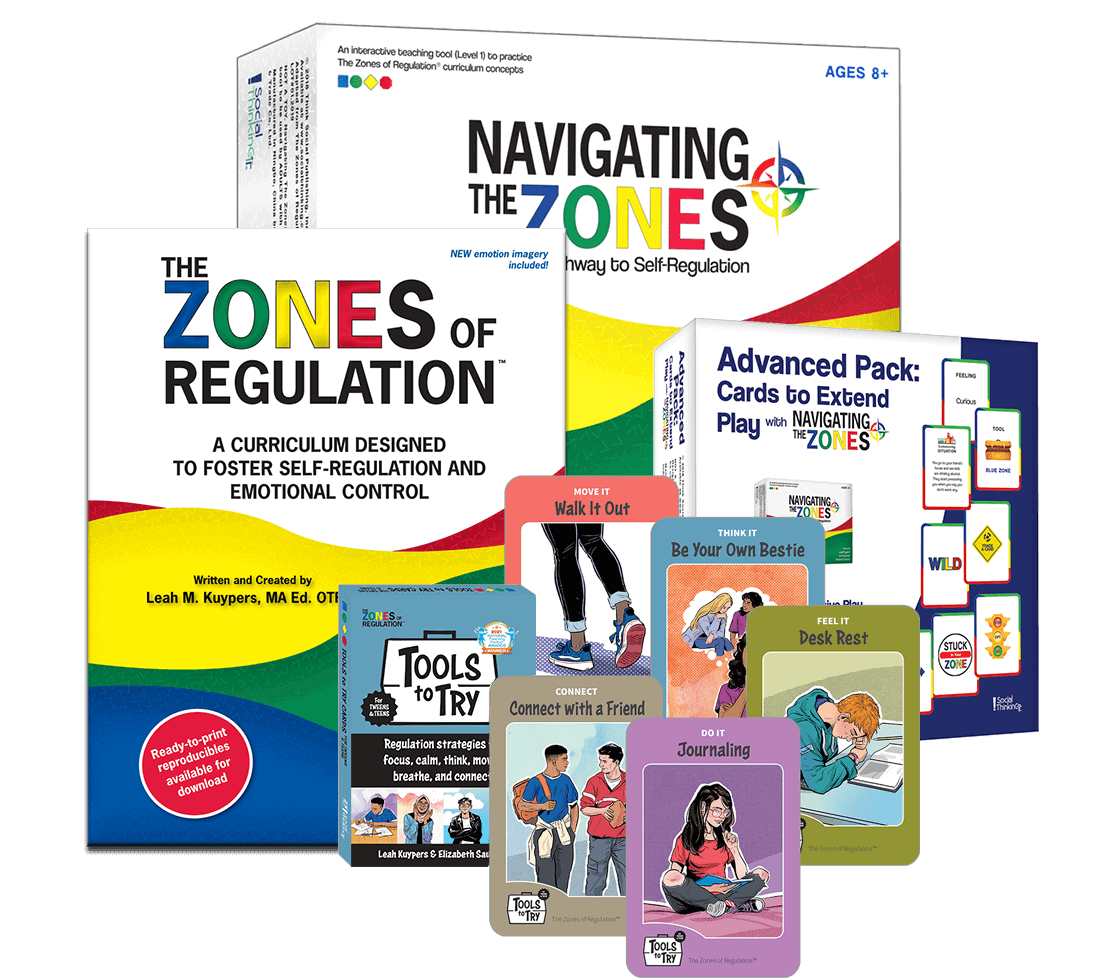
Part 2 of this two-part series explores
- Strategies to help students become more intentionally metacognitive
- How social conformity is not the same thing as peer pressure
- Why the perspective-taking loop is an essential when relating to others
Part 1 of this two-part series discusses teens’ expectations for working on social emotional self-regulation skills. We explore how to help students deemed “oppositional or resistant” to active participation in sessions.
3.5 hours of training and CE credit available for select professionals. For any special accommodations or assistance with resources email us.
Part 2: Choosing Social Strategies to Take Charge of One’s Thoughts, Feelings, and Actions
Series Name: Exploring the Unique Needs of Teens Who Are Developing Social Self-Awareness
Replay access through November 30, 2023
Detailed Description
Who should attend
In our first of this two-course series, attendees explore developmental needs of teens with social emotional learning (SEL) challenges, how education and employment laws in the USA evolve as students age into adulthood, as well as learn how to better understand and support those who appear largely resistant to any type of structured participation. We encourage you to begin learning about teens with social emotional learning challenges with this course: Part 1: How Can We Help Teens When They Want Us to Go Away?
In this second course, the focus is on learning more about the power of one’s own metacognition and how to build essential strategies to manage our students’ more intense negative feelings and impulsive thoughts.
Social conformity or nonconformity is often on the mind of teens. In this section, we will examine how group learning and teamwork is different than individual work and requires some level of flexibility to help meet collective goals. As teens become more sophisticated social thinkers, we also discuss how we make choices in what we do and say based on our own social goals and personal/cultural.
To encourage student motivation, we examine how to build upon their needed autonomy and guide them toward their own self-directed success through the development of their self-management campaign and their self-designed “public relations campaign.”
Some of the many concepts explored in this course include but are not limited to:
- Learning the power of metacognitive learning
- Helping teens define what strategies they personally may find useful based on their own goals and stressors
- Examining the role of social conformity and the role of social nonconformity. Both are ok.
- Exploring the role of executive functions within self-regulation
- Learning how to manage basic executive functions and dread when developing one’s own unique self-management campaign
- Using an “I Dread This” scale
- Examining how we want others to see us – or own public relations
- Exploring how the social world works when interpreting each other’s intentions
- Understanding the perspective-taking loop
- Practicing social competencies: attend, interpret, problem solve to respond
- Using Self-evaluation of how one’s social responses (do and say) might be interpreted by others
- Previously recorded Q&A session at the end of course.
Who Should Attend
The Social Thinking Methodology is used by a wide variety of professionals; including speech-language pathologists, special and general education teachers, social workers, counselors, clinical and school psychologists, occupational therapists, behavior specialists, and school administrators to name a few. It’s also used by family members and caregivers across settings.
About this Series
A two-part series on Tweens & Teens
The Social Thinking® Methodology emerged from working with teenagers in high school. It was apparent, at that time, that some needed help with executive functions and learning how to engage in the process of social emotional learning (SEL). Over the years we have developed frameworks, strategies, and tools for teens to explore how the social world works to help them learn to navigate to self-regulate in that world. In this process, we have learned to recognize the challenges of or more resistant (self-protective) social learners. And, it is important that interventionists (parents and professionals) understand how the expectations within the social world are literally shifting under their children’s’ feet as they legal world no longer views them as children. This series provides some highlights of what we’ve learned about working with teens with SEL challenges for the past 25 years.
Teenagers with social emotional learning differences and/or challenges or others with social thinking needs don’t want to be treated like children. In this two-course series we explore how to help teens socially and emotionally take charge of themselves as we help to prepare them for life beyond their highly structured high-school experience.
In this two-part series, we teach interventionists about the changes in US laws that affect students as they age out of childhood. We explain the needs and strategies for working with resistant (or self-protective) social emotional learners. We also teach and model how to help all teens embrace their own metacognitive learning to guide creation of their self-management and public relations campaigns with the following two courses:
Part 1: How Can We Help Teens When They Want Us to Go Away?
Part 2: Choosing Social Strategies to Take Charge of One’s Thoughts, Feelings, and Actions
Learning Objectives and Agenda
Objectives
Participants will be able to:
- Explain the value of metacognition when learning to self-regulate
- Describe how social conformity is not the same thing as peer pressure
- Explain why the perspective-taking loop is an essential consideration when relating to others
Agenda
- 1 hour and 20 minutes
- Power up metacognitive learning to help teens evaluate whether they are controlling their brain or whether their brain is controlling them
- Learn the power of strategies to help with self-regulation when experiencing anxiety or other stressors.
- Rethink what students were taught about expected and unexpected behaviors by examining conformity and when it may be “expected” to not conform
- Explore how to teach basic executive functions to help students meet their own goals by engaging in a self-management campaign.
- 1 hour and 40 minutes
- Continue with developing one’s own self-management campaign.
- Explore how one’s social responses are part of their own public relations campaign. Develop tools and strategies to help students learn to better manage their campaign.
- 30-minute Previously Recorded Q & A
Continuing Education Credit
3.5 hours toward CE credit, if applicable
Click here to see if you can receive CE credit by Profession and by State
We are proud to provide access to continuing education credit for:
- Speech-Language Pathologists
- Educators
- ...and others!
Technical requirements to participate in online training
Streaming compatible browser
The best browser for streaming is Google Chrome. If you are unable to use Chrome, please make sure the version of your browser is the latest and greatest.
Download ChromeHigh-speed internet connection
Make sure you are accessing the online course on a device that is connected to high speed internet—that means your download speed is at least 25Mbps.
Run Internet Speed TestOpen firewall ports
If you are accessing the online course from your school or organization, ask your network administrator if there are any firewall ports that need to be opened.
Learn More









